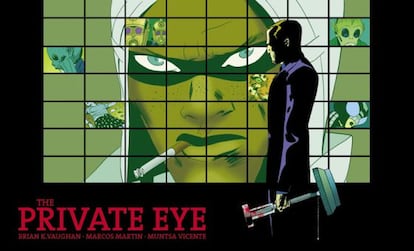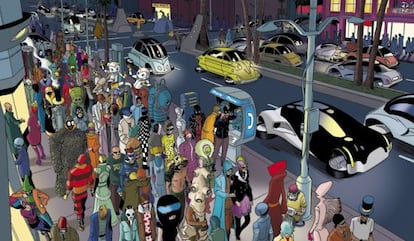Rave reviews for US-Spanish comic that foresaw Snowden scandal
Prescient publication 'The Private Eye' is only available to online readers

The "datapocalypse" was not revealed by NSA contractor Edward Snowden. It was foretold months ahead of time by Marcos Martín, Montsa Vicente and Brian K. Vaughan, but readers thought it was just a sci-fi story. Maybe that is why The Private Eye, a comic that internet users can download for free (or by "paying whatever the hell they want") was designated by US critics as one of the highlights of 2013.
"The best thing about The Private Eye is how it tortures you with what it means to live in a hyper-connected world," write reviewers on the gaming website Kotaku. "Its characters move through a world where keeping secrets is an obsession because people lived through a datapocalypse where all their collective internet dirty laundry was public."
USA Today, The Verge and The Hollywood Reporter also selected The Private Eye as one of the most salient comics to come out last year.
The "datapocalypse" was foretold months ahead of time by the three authors
The digital comic, which is not available in print, is illustrated and colored by the Catalan artists Marcos Martín and Montsa Vicente, and written by Brian K. Vaughan, an American screenwriter-producer for the TV shows Lost and Stephen King's Under the Dome.
The action takes place in the US in the year 2076, when everyone and everything is under permanent surveillance. An indiscreet paparazzo and a private eye who works outside the law are the main characters in a world of science-fiction that would effectively become a reality just months after the first issue was released, following Snowden's revelations about massive surveillance by the US.
"I think we really nailed the plot," explains Martín in his Barcelona studio. "Maybe that is why people who download the comic are not the average readers you find on the traditional comic circuits. We've seen a lot of university professors, a lot of college students and lots of journalists."

The story, which will be told over 10 issues, began in March with the first release. "We thought that if things went halfway well we might reach chapter three," says Martín. The team has just published the fifth installment.
The average payment they get is a little over two dollars per download (1.4 euros) while the payment-to-download ratio is around 50 dollar cents (36 euro cents) per unique visitor. The first chapter got the most downloads, but also the fewest payments, barely half of all downloads. Now there are fewer downloads, but 80 percent of them are accompanied by some form of payment.
Besides constituting an experiment in web economics, the work has attracted critical acclaim. The first five issues are already available in five languages (English, Spanish, Catalan, Portuguese and French). "We've had offers to have them translated into all kinds of languages, from Greek to Malaysian, but besides the questionable real demand for it in those geographic regions, it means I have to label the words, and I don't have the time," explains Martín. "The priority is getting the comics published."
Its characters live in a world where keeping secrets is an obsession"
All three are already working on chapter six.
"I would sum up our experience by saying that the model works," adds the illustrator. "It's possible we're not making as much as we might have with a publisher like Image, but we are making more than we would have with any of the two heavyweights, Marvel or DC."
English-language readers are "by far" the most generous payers, notes Martín. American, British, Canadian and Australian users tend to leave a token of their appreciation, while Spaniards and Brazilians download a lot but pay very little, even though payments as small as one dollar cent are accepted.
In 2076 everyone and everything is under permanent surveillance
The website only changes with every new issue, which happens roughly once every two months. "We are thinking about taking in other authors and adding more resources, but we are neither entrepreneurs nor publishers and cannot go around looking for them."
Martín rejects any thoughts of printing The Private Eye on paper. "Exclusive digital distribution is part of the project's originality," he says. But starting this Monday it was possible to purchase prints with illustrations from the comic for 20 dollars and 50 dollars.
The saga will end in 2014, after which nobody knows what is next. "We don't even know ourselves, but I think that's part of the charm. There is no release date for each new chapter, or even the certainty that there will be one. It's the readers who keep the project going. If they like it and they pay, it will continue. If not, then it's not worth it to go on."
The Kotaku review goes on to say that "in a year when the reality of the surveillance state was impossible to ignore, this digitally distributed title makes you think about your own web browsing and social network sharing in the worst possible way."
Tu suscripción se está usando en otro dispositivo
¿Quieres añadir otro usuario a tu suscripción?
Si continúas leyendo en este dispositivo, no se podrá leer en el otro.
FlechaTu suscripción se está usando en otro dispositivo y solo puedes acceder a EL PAÍS desde un dispositivo a la vez.
Si quieres compartir tu cuenta, cambia tu suscripción a la modalidad Premium, así podrás añadir otro usuario. Cada uno accederá con su propia cuenta de email, lo que os permitirá personalizar vuestra experiencia en EL PAÍS.
¿Tienes una suscripción de empresa? Accede aquí para contratar más cuentas.
En el caso de no saber quién está usando tu cuenta, te recomendamos cambiar tu contraseña aquí.
Si decides continuar compartiendo tu cuenta, este mensaje se mostrará en tu dispositivo y en el de la otra persona que está usando tu cuenta de forma indefinida, afectando a tu experiencia de lectura. Puedes consultar aquí los términos y condiciones de la suscripción digital.








































